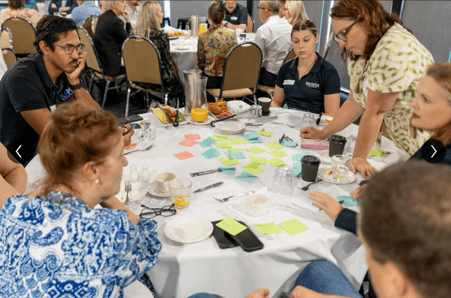By Miranda Mears
From Skills Lists to Capability Advantage: Rethinking Regional Workforce Strategy

One thing that was clear in the room is that we are not short of good people and great minds who are deeply committed to addressing the challenge that we can't solve tomorrow’s challenges with yesterday’s tools.
It was an absolute pleasure to listen and hear Wayde Chiesa CEO from RDA Townsville and North West Queensland talk about RDANWQ strategic priorities and recent deep studies. We also heard as Keynote from Dr Caroline Smith
Executive Director of the Australian Industry Group's Centre for Education and Training.
Her insights gave us some really interesting insights into current and future needs and trends. This helped to set the seen for some meaningful conversations around the tables from all walks of industry , education and government as to what our region needs to succeed.
It was an absolute pleasure to listen to Wayde Chiesa and Dr Caroline Smith
Executive Director of the Australian Industry Group's Centre for Education and Training. Her insights gave us a valuable view into current and future workforce trends—setting the scene for meaningful conversations across industry, education and policy about what our region needs to succeed.
One of the things that I have been thinking about for some time and been watching the evolution of our skills frameworks here in Australia but I thought I would share few reflections on my thoughts on how we can better recognise and build the capabilities that matter most—especially in future-facing industries.
→ Read the full blog post here:
https://lnkd.in/gvgi72ZV
The Australian Impact Group Cyber Sense SMB Cyber Security Program Australian Industry Group (Ai Group)
hashtag#FutureWorkforce hashtag#RegionalDevelopment hashtag#NorthWestQLD hashtag#SkillsThatMatter hashtag#CapabilityFrameworks hashtag#LifelongLearning hashtag#RDATNWQ

In regional Australia, we continue to talk about workforce development in terms of shortages—shortages of capacity, capability , continuity and pipeline. And fair too they are critical and complex issues facing all regions, communities and businesses that no one person, organisation and region will fix alone.
But it does make me wonder - does this framing misses a deeper issue ? What if our real constraint isn’t just skills—but the way we define, value, and recognise capability?
Today I had the pleasure of attending the Regional Development Australia Townsville and North West Queensland Future Workforce Summit. One thing that was clear in the room is that one thing we are not short of in our region is good people and great minds who are deeply committing to addressing the challenge that we can't solve tomorrow’s challenges with yesterday’s tools.
It was an absolute pleasure to listen and hear Wayde CEO from RDA Townsville and North West Queensland talk about RDANWQ strategic priorities and recent deep studies. We also heard as Keynote from Dr. Caroline Smith Executive Director of the Australian Industry Group's Centre for Education and Training.
Her insights gave us some really interesting insights into current and future needs and trends. This helped to set the seen for some meaningful conversations around the tables from all walks of industry , education and government as to what our region needs to succeed.
Drawing on national and global research, she shared that Australia is largely aligned with our peers on the consistent workforce challenges being faced by businesses and on core skill priorities. These include analytical thinking, resilience, flexibility, curiosity, lifelong learning, leadership, and creative thinking—capabilities essential to navigating complexity and transformation.
Emerging skills that are most growing include AI, big data, and technology literacy are growing rapidly, but they’re not replacing core skills. They’re built on them and they are not isolated to all business.
But we don't have a blank canvas which is great but we are facing an alignment challenge. How do we link these high-value capabilities with education, training, and employment systems that still often operate in outdated silos?
We talk about "foundation skills" and "employability skills" - as a previous RTO owner I have mapped a training package or two to these—but future industries aren’t looking for just prepared workers. They need adaptive, capable people who can move across sectors, solve emerging problems, and work with technologies that haven’t even been mainstreamed yet - and they need to have a system that allows them to move and their capabilities mapped and understood.
I don't have anywhere near the answers or all the information but here is what I think are where we can get some advantage out of adaption. If we accept that the future of work is built on adaptable capabilities—not just static qualifications or on the job training—then we need to look seriously at what systems, signals, and strategies will allow regions like North West Queensland to thrive.
-
Shift Foundation Skills from Deficit Framing to Strategic Assets
Foundation and employability skills have long been framed as a kind of pre-employment checklist or remedial catch-up. But the data tells a different story. Resilience, analytical thinking, flexibility, curiosity—these are the same traits being identified globally as top priority capabilities in AI-enabled, innovation-driven industries. We don’t need to invent new language—we need to elevate what’s already there and build frameworks that track, validate, and value these as core enablers. -
Rebuild Around Capability Matrices, Not Just Job Descriptions
What’s often missing from regional workforce planning is visibility. Not of who’s qualified—but of who’s capable. Capability matrices—structured ways to map and track transversal skills across people and roles—can help education providers, employers, and policy planners make smarter decisions. Whether through national learner records, AI-assisted credentialing tools, or regionally led capability dashboards, we can start to see people not just for the job they’re trained for, but for the value they can offer across evolving roles. -
Embed Real-World, Recognised Industry Certifications and Micro-Credentials into Pathways
One thing that often leaves learners disillusioned is that when they graduate with their newly minted qualifications They realise that - well they are skill missing lots of pieces of paper and digital badges that are more highly valued. Industry Certifications and Credentials. If embedded into qualifications and aligned with elective units or credit-bearing modules, these can support portability, confidence, and industry relevance—especially for Defence transitions and mid-career change. Further a message consistently talked about in the room was the importance of rethinking apprenticeships and earn and learn barriers, blockers and boosters. -
Prioritise Adaptability and Digital Fluency Across All Sectors
Digital isn’t an industry—it’s an enabler. That means digital skills—AI, automation literacy, cyber security basics, data fluency—need to be foundational across all pathways, from agriculture to aged care to engineering. We don’t need every worker to code although you will be surprised the industries do—but we do need every worker to operate, understand, and adapt in a digital environment and understand complex system , integrated environments and the policy and security required to protect it. -
Recognise That Regional Futures Rely on Systems Thinking
Adaptation isn’t an individual task—it’s a systemic one. If we want to genuinely futureproof regional participation and prosperity, we need capability mapping, interoperable data infrastructure, and baseline indices built into existing frameworks like the Australian Core Skills Framework and Digital Work Skills Framework. These must align with policy reform, employer engagement, and cultural legitimacy for non-linear pathways. The regions that succeed will be those that treat capability not just as an outcome—but as an investment in long-term resilience.
The question we should be asking isn’t just what skills do we need now and what jobs will exist in 2030?” It’s: what capabilities do we need to thrive no matter what comes next and how can we build, map and measure these consistently across industries, jobs and people.
.png?width=172&height=136&name=AIG%20LOGO%20NEW%20(185%20x%20150%20px).png)


